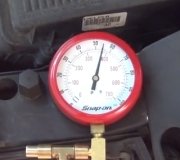I can offer two suggestions. When I worked in the tv / vcr repair business, my very reputable boss had this advice for people thinking of trading in their old tv on a new one. "A good working tv might be worth $100.00 towards a new one, but a broken tv that needs $100.00 worth of repairs before it can be resold might still be worth $75.00 on trade". In other words, if you keep it until something major goes wrong with it, you won't necessarily loose as much in trade-in value as the cost of repairs. Now, that was between 15 and 35 years ago when new tvs cost $500.00 to $800.00 dollars and were not remote-controlled. But the same logic applies to cars. The exception would be if you plan on selling it yourself through classified ads or posters. The buyer will want a car without problems. But if you trade it in at a dealer, they expect stuff is going to need to be fixed and that is already factored in to the price they offer you for your car. As with those old tvs, you aren't going to get much more for trade-in value if you fix everything possible, and then trade it in.
Another way to look at it is to forget about the car's current value. I argue this point with my cousin all the time. If your car needs $1000.00 worth of repairs, what difference does it make if the car is worth $100.00 or $10,000.00? The value is only important if you are trying to sell it. If the alternative is buying a different car, are you better off with monthly car payments that will total much more than those repairs? The car you buy could also need repairs in the next few months or years, so why not spend your repair money on a car that is paid for, you like, and you trust?
What if you had to spend only $200.00 on repairs? Would your car be worth it? Sure. What if you had to do that again in two months? Is your car worth it? Of course. What if you spent $1000.00 of various repairs and maintenance in the course of a year? Wouldn't bat an eye. Now, ... What if you had to pay for all of those repairs at once, and that took care of it for the rest of the year? The time to be concerned is when it appears likely there will be more of those $1000.00 repairs popping up on a regular basis.
The second piece of wisdom would be to seek out a local community college with an Automotive program. I taught this for nine years, and we were always looking for live work. Our students were well supervised and had training and worked on school-owned practice cars long before they were allowed to work on customers' cars. We charged $10.00 per hour to fund our "breakage" account in case we damaged something. The two drawbacks to this are you may be limited to a very specific time of the year certain work can be done, and a two-hour repair might take two weeks to get your car back. During that time, you're walking, taking the bus, or renting a different car.
We taught the Suspension and Alignment class once per year, for eight weeks. The first two or three weeks we covered theory and practice. That left about six weeks that our shop was in competition with the shops in the area that might hire our graduates. They understood our need for real work, so they didn't complain, but that's why we stuck to our schedule. We would not do brake repairs during the 8-week Electrical class, for example.
The reason a simple repair can take so long is there might be a point in the middle of the job when we have to cover something important in the classroom, or I might call everyone over to someone's project for an impromptu demonstration. All other work stops during those times. At other times, you might get your car back very quickly. As an example, we only had three alignment computers that had to be shared by 16 kids. It was important to get those jobs done so the rest of the students got their experience with that equipment. Still, a two-hour alignment could take them the full four-hour class day.
The advantage to our system was you were charged 10 bucks per hour for the time specified for that job so a two-hour job would cost you 20 bucks even if it took us a week to get it done. That way, the students don't rush and risk making mistakes. There was also no penalty if they had to do it over to do it right.
Caradiodoc
Monday, April 12th, 2010 AT 2:49 PM


